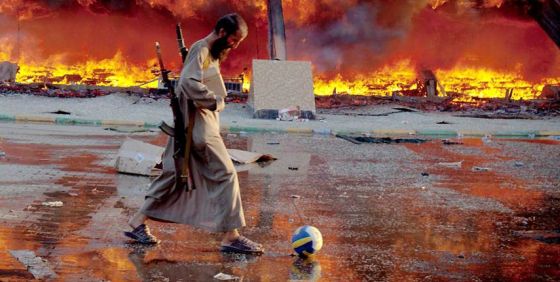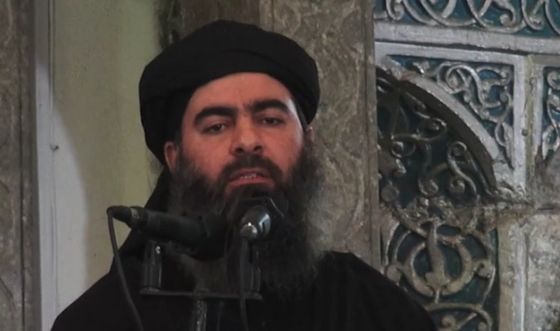In an interview with Fox News presenter Mike Huckabee, Naftali Bennett, a right-wing extremist who is currently Israel’s Minister of the Economy, held up the tail of a Palestinian rocket and said:
I’d like everyone of your viewers to imagine this missile — this rocket, it’s about eight feet long filled with explosives and shrapnel — and imagine how they’d feel if one of these rockets fell in their neighborhood, in their children’s kindergarten, or school, or God forbid on their own home. That’s what Israel is facing today. And we’re not really seeing the world act against that, so we understand that we are on our own. And Mike, we will defend ourselves and we will win.
Bennett is not alone in feeling that Israelis are failing to receive the global sympathy they deserve.
In its effort to try and raise international awareness of Israel’s plight, the Israel Defense Forces has been putting videos on YouTube such as this:
“Hamas Rockets Disrupt Summer Vacation in Southern Israel”:
In Gaza there are no air-raid warning sirens. There is no air defense system that would alert the population to incoming strikes, but even if there was, sirens wouldn’t be any use blaring without interruption when there is nowhere to run.
In what should be regarded as Israel’s latest PR stunt, some air strikes are now being preceded by so-called “warning missiles” — missiles that have a greater destructive impact that the typical Palestinian rocket.
If the occupants of a building don’t get killed or maimed by the “warning,” the idea, supposedly, is that they have been afforded the opportunity to take cover. If it’s difficult to imagine how this works, imagine what you would do if you happened to be inside this house:
This is what Gaza is facing today.
And this is what Israel faces:
And as Gaza rockets interrupt a wedding in Ashdod, this is how daily life is being interrupted in Gaza:
Back in Ashdod, Israelis run for cover:
While so far not a single Israeli has been killed in a rocket attack, one of the latest strikes on Gaza killed eighteen people in one building:
In one of the most destructive attacks on Israel, a gas station in Ashdod was hit:
Meanwhile, in Gaza, as first responders attempted to rescue the victims of an Israeli air strike, more missiles fell:
An Israeli mother in Sderot tells a CNN reporter about her fears for her children:
This is how Abeer Ayyoub describes what it’s like to face direct threats from the IDF:
Enjoying the relatively calm hours in the early morning following a noisy sleepless night, everyone in the house was sleeping when my brother, who lives in the same building, came to wake us. He told us that our neighbor got a phone call from the IDF asking him to evacuate his house, which was about to be bombed. Our neighbor’s house is only couple of meters away; getting ready for the closest bombardment yet was so traumatizing.
My mother opened all the windows so the strike wouldn’t break them; broken glass is usually the main cause of injuries in such cases. The 20 members of my extended family gathered in the living room waiting for the awful event. Taking care of the children who didn’t know what was going on was the hardest challenge. As I write this, a couple of hours have passed since the call, and we are still, surprisingly, waiting for the strike so we can get rid of the massive panic everyone at home is suffering.
Last night wasn’t like any other night. The extremely noisy drones haven’t stopped circling the sky of Gaza for a second, F16s haven’t stopped targeting for a single hour, and the gunboats continued to shell the area near the beach for the whole night.
I could not sleep for a second as the explosions were surrounding us; in the besieged coastal enclave, the furthest point in Gaza is still close by, as the territory is so small. I was following the news on social media, TV and radio channels. For the whole night, the rockets were targeting buildings with tens of people sleeping inside. Nothing changed from one area to another, except for the family names.
Curiously, I was looking for Israeli spokesperson interviews online to see how they connected the announced goals of Operation Protective Edge, stopping the rockets from Gaza and damaging the infrastructure of Hamas, and killing dozens of children and other innocent civilians while sleeping. I watched an interview with IDF spokesman Avichay Adrey on one of the Arabic channels, and I was totally surprised by him talking about the success of the operation so far.
I don’t know what success Israel is talking about when most of the 86 people killed (through early Thursday) were children and women. What was more surprising, and even more rude, was that Adrey justified the IDF shelling on civilian homes by saying that the army usually hit the house with a warning shot before it starts damaging the house. I don’t know how an army that warns people by shooting them can respect itself.
Through social media, I could know that most of the Israelis are totally misled about what’s going on in Gaza. My Israeli followers on Twitter keep telling me that I should move away from Hamas if I want to stay alive, as Hamas is a monster that lives somewhere here. In contrast, I could always understand how it feels for an Israeli child to be killed. I never excluded humanity from how I look at the Israeli-Palestinian scene.
After dozens of houses were demolished, I started to feel real danger; my siblings did, too. Israel always claimed that civilians are only hurt when they are near areas where Palestinian fighters fire rockets, yet this narrative is not acceptable anymore. I think that Israel is trying to place more pressure on Hamas to seek a cease-fire by killing more civilians.
Visiting the main hospital in the central Gaza Strip, I could zoom in on the Israeli craziness more and more. Injured babies, burnt flesh and children who still don’t know they lost their parents and siblings are everywhere in the hospital. Much worse, I am told that the hospital has run through over 35 percent of its medicine and 55 percent of its medical supplies. Surprisingly, yet maybe not, none of the Arab or international countries around seem to be paying attention to what’s happening to the 1.8 million-plus human beings living in Gaza.
Being left under crazy rockets, the lack of regional and international support and Palestinian President Mahmoud Abbas’ disappointing attitude is leaving people here hopeless and desperate. I now know why Israel is violating international human rights laws, because no one in the world dares to cast a veto on its actions.
Human beings have an innate capacity to recognize the suffering of others. Lack of empathy has to be learned.
Having become lost in their own sense of victimization, what Naftali Bennett and those who think like him perceive as a global disregard for the welfare of Israelis, is in fact a projection of their own callousness.
Were he and those who sanction Israel’s current military actions to fully imagine their effects, they could not do so without recognizing their own brutality.
They prefer instead to hide behind self-serving delusions — we have no choice; we are exercising great restraint; we issue warnings; we attack with great precision.
The world is not failing to see what is happening in Israel. On the contrary, it is Israel that refuses to truly see what it is doing in Gaza.




